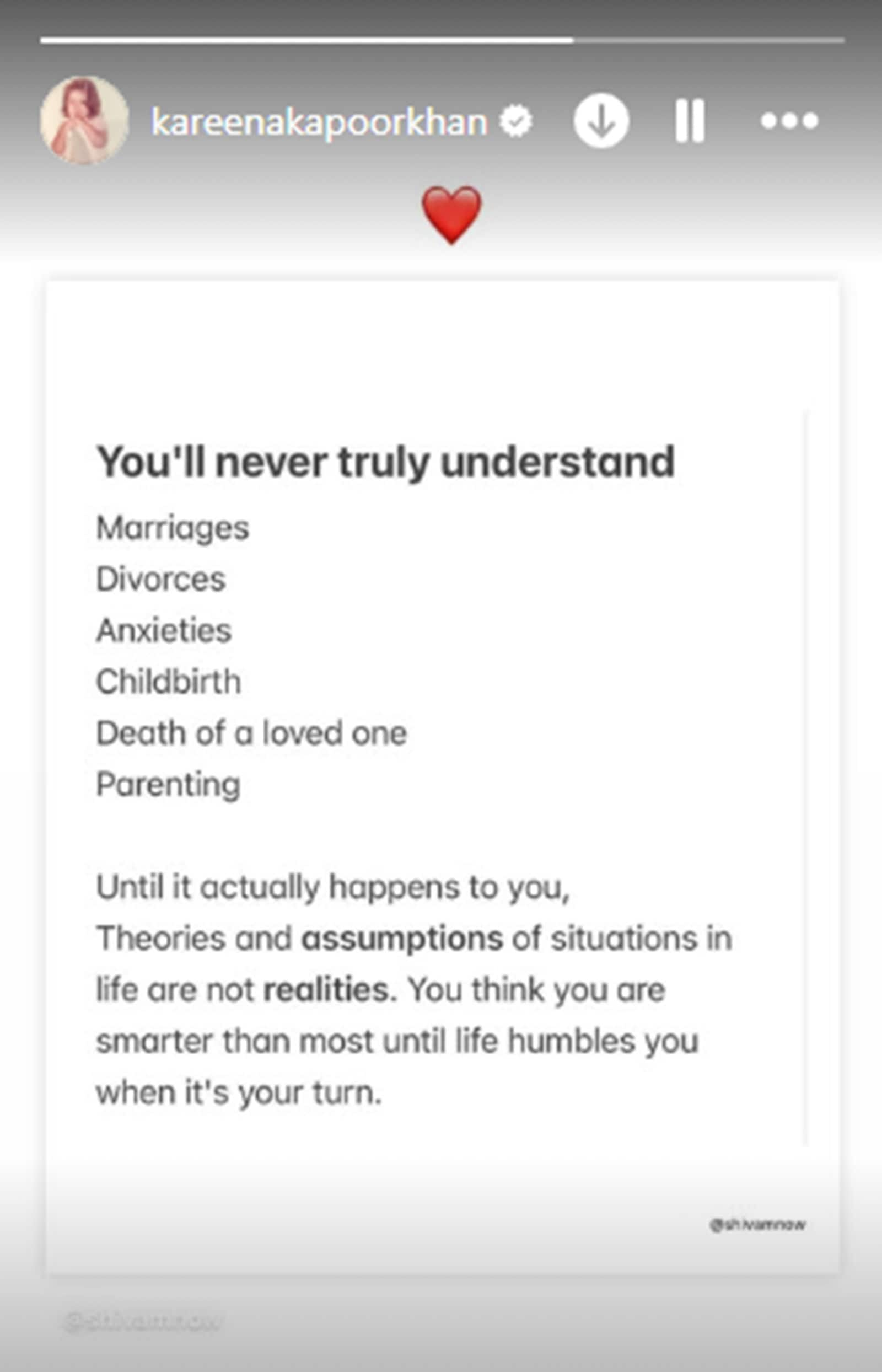📣 For more lifestyle news, click here to join our WhatsApp Channel and also follow us on Instagram
‘You think you are smarter than most until…’: Kareena Kapoor shares cryptic post on how personal struggles reshape perspective weeks after attack on Saif Ali Khan
An expert answers why people often struggle to empathise with life challenges until they experience them personally?
 "You’ll never truly understand Marriages, Divorces, Anxieties, Childbirth, Death of a loved one, Parenting," mentioned a post reshared by Kareena Kapoor Khan (Source: Express photo)
"You’ll never truly understand Marriages, Divorces, Anxieties, Childbirth, Death of a loved one, Parenting," mentioned a post reshared by Kareena Kapoor Khan (Source: Express photo)Kareena Kapoor Khan recently shared a cryptic post highlighting how life’s toughest moments can change one’s perspective. Her words about the humbling nature of real-life experiences come just weeks after her husband, Saif Ali Khan, survived a violent attack at their Mumbai residence.
While the post she shared does not explicitly reference the incident, it touches on how personal struggles — be it marriage, parenting, or loss — can only be fully understood when one goes through them firsthand. “You’ll never truly understand marriages, divorces, anxieties, childbirth, death of a loved one, parenting. Until it actually happens to you, theories and assumptions of situations in life are not realities. You think you are smarter than most until life humbles you when it’s your turn,” the actor posted with a heart emoji on her Instagram story on Saturday.
Difficult experiences often challenge our assumptions and force us to see things differently. Many people believe they have all the answers until life throws them into unexpected situations, making them realise how little they actually knew.
Why do people often struggle to empathise with life challenges until they experience them personally?
Gurleen Baruah, existential psychologist at That Cultural Thing, tells indianexpress.com, “People often struggle to empathise with life challenges like marriage, grief, or anxiety until they experience them personally because true empathy isn’t just about understanding — it’s about feeling. Until someone has lived through a situation, their mind processes it in a detached, logical way rather than an emotional one. This is because our brains rely on past experiences to interpret emotions. If we haven’t felt something before, we tend to underestimate its intensity or complexity.”
 Kareena Kapoor reshared a post about the humbling nature of real-life experiences (Source: Instagram/Kareena Kapoor Khan)
Kareena Kapoor reshared a post about the humbling nature of real-life experiences (Source: Instagram/Kareena Kapoor Khan)
The brain protects us from unnecessary distress by keeping intense emotions at a distance until they become personal, she adds. Social conditioning also plays a role; many cultures emphasise resilience, making people dismiss struggles they haven’t encountered firsthand. But once someone experiences a challenge, their perception shifts. “They now have a visceral memory to attach to it, making them more compassionate towards others in similar situations. It’s not that people lack empathy before experiencing something — it’s just that real understanding often requires living through the emotions, not just observing them,” states the psychologist.
How going through a traumatic event changes a person’s perception of themselves and the world around them
Going through a traumatic event can leave deep psychological scars, reshaping how a person sees both themselves and the world. Baruah notes, “The amygdala, the brain’s fear center, becomes hyperactive after trauma, making the world feel more dangerous than before. Even in safe situations, the brain may stay on high alert, scanning for threats, leading to heightened anxiety, hypervigilance, or even emotional numbness. This shift isn’t just mental — it’s physiological. The body and brain adapt to trauma by rewiring responses to protect against future harm, but this can also lead to feelings of alienation, distrust, or a sense that life is permanently changed.”
Self-perception often takes a hit, too. Baruah shares that trauma can shatter a person’s belief in their own resilience, “making them feel weaker, broken, or fundamentally different” from who they were before. Some struggle with guilt or shame, feeling they should have responded differently, even when they had no control. Others might dissociate from their old self entirely, as if they’re no longer the same person.
Baruah mentions, “The brain’s memory systems — especially the hippocampus — can also be affected, making the past feel like a blurry mess or, conversely, trapping someone in vivid, intrusive flashbacks. Over time, trauma can reshape identity, leading to either a loss of self or, in some cases, post-traumatic growth, where individuals find new meaning, resilience, or purpose in the aftermath of their suffering.”
📣 For more lifestyle news, click here to join our WhatsApp Channel and also follow us on Instagram



- 01
- 02
- 03
- 04
- 05
























